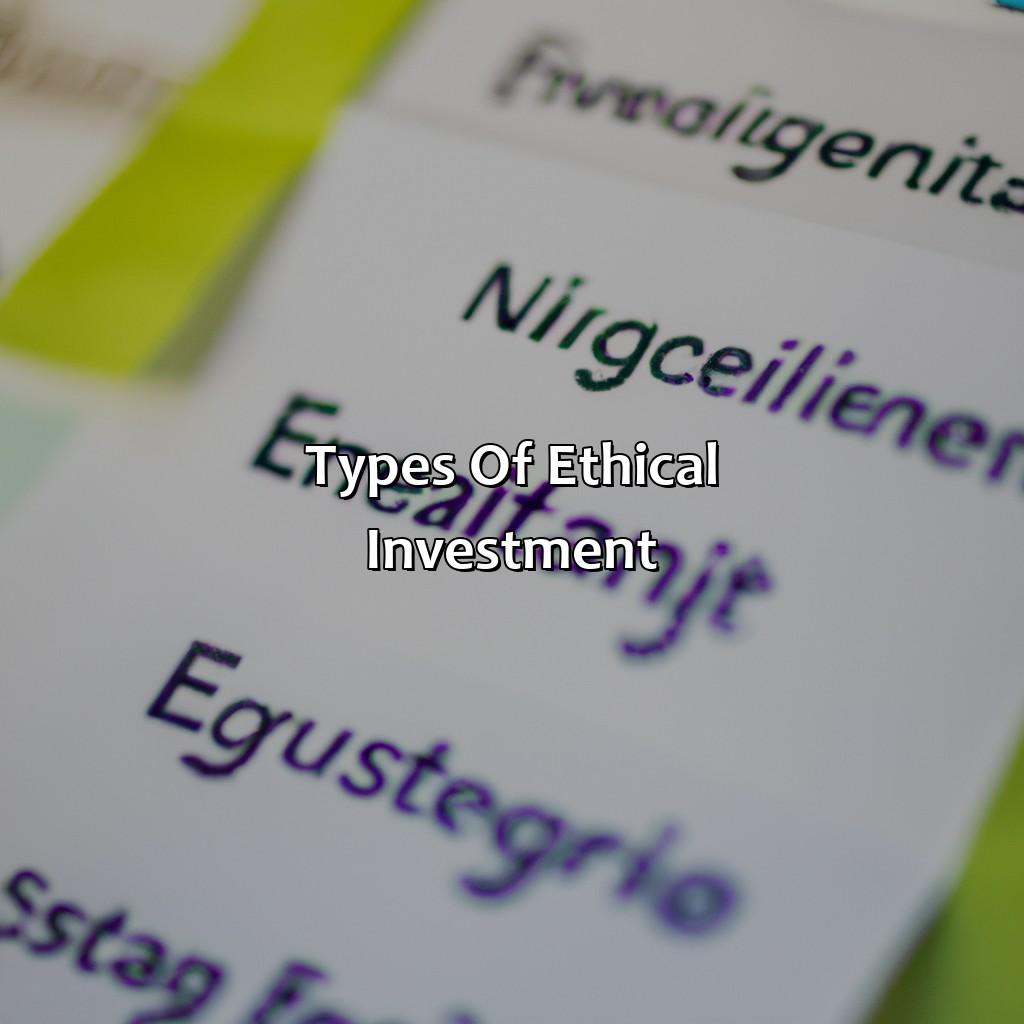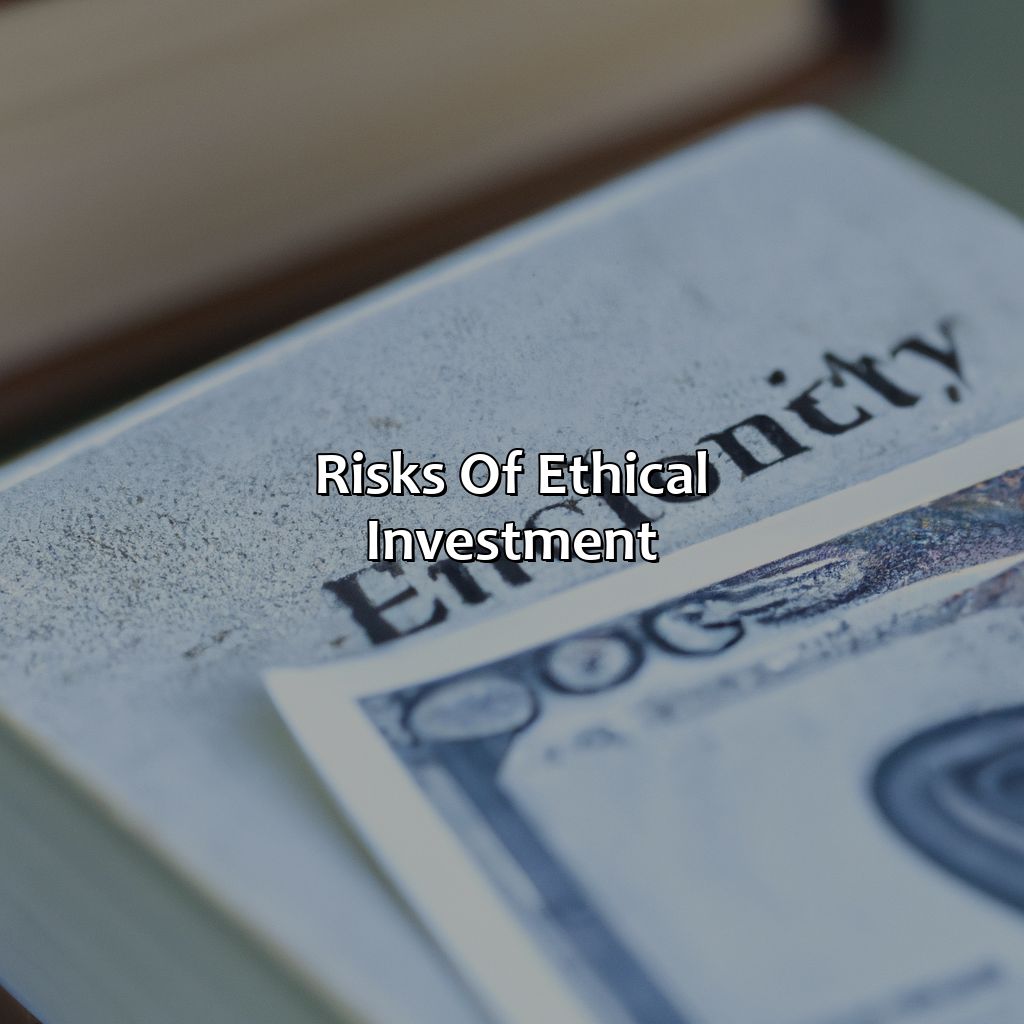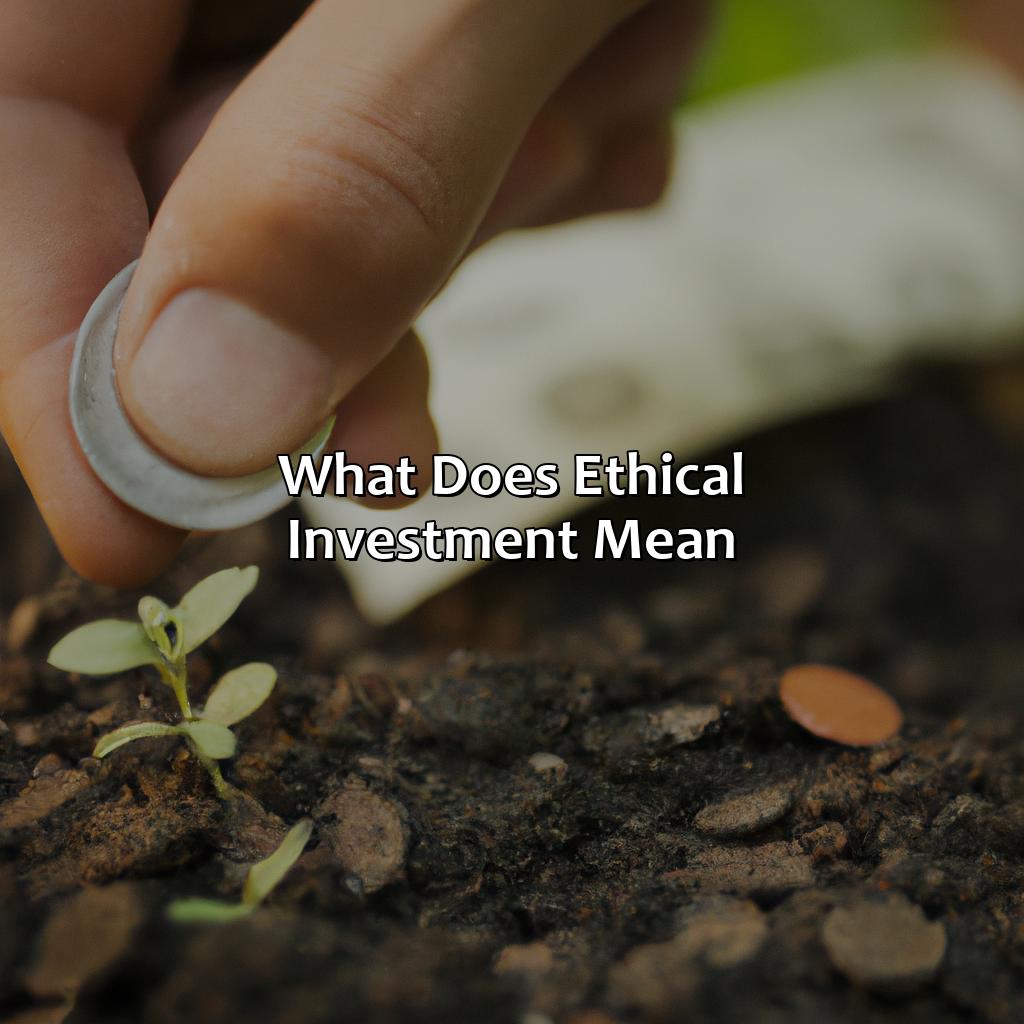What Does Ethical Investment Mean?
Key Takeaway:
- Ethical investment refers to investing in companies and industries that align with personal values and beliefs, such as environmental stewardship, social responsibility, and human rights.
- There are several types of ethical investment strategies, including positive screening, negative screening, best-in-class screening, and socially responsible investing, each with their own approach to identifying suitable investments.
- One of the primary benefits of ethical investment is the potential for positive impact on the environment and society, as well as the potential for higher returns in the long term. However, investors must also be aware of the risks associated with limited investment options and potential for lower returns.
Do you want to make sure your investments are ethical? It’s never been more important to know what ethical investment means and how to get involved. You can start today with the information in this article.
Types of Ethical Investment
In the realm of socially conscious investing, various approaches have been developed to differentiate Ethical Investment.
- Impact Investing: Investments made with the intention of generating a social or environmental benefit along with a financial return.
- ESG Investing: An approach that aims to select companies based on Environmental, Social, and Governance criteria.
- SRI: Socially Responsible Investing considers both financial return and social good. It involves avoiding stocks that are involved in certain industries like tobacco, weapons or alcohol to align with a particular set of values.
There are other Ethical Investment approaches like Shariah-compliant investment, green bonds, and positive screening.
Investors interested in Ethical Investment can choose the approach that aligns best with their values and goals. One of the first recorded Ethical Investment initiatives was launched in the mid-18th century by a religious group called the Quakers. They refused to invest in businesses related to slavery, war, or alcohol. This approach is still in practice today, reflecting the importance of aligning investment decisions with one’s personal values.

Image credits: retiregenz.com by Harry Arnold
Benefits of Ethical Investment
In the world of finance, the advantages of using ethical investment strategies are manifold. Investing sustainably, or with a view toward the environment, social justice and governance, has become essential for corporations and individuals alike.
- Positive impact on society: Ethical investment has the potential to make a positive impact on society. It can support companies with ethical practices and contribute to the overall betterment of society.
- Sustainable investments: Ethical investments are typically environmentally responsible and support sustainable practices. They help reduce the negative impact of corporations on the environment and ultimately benefit the planet.
- Profitable returns: Ethical investments, over time, can generate returns that are comparable to, if not higher than, traditional investments. As more investors recognize sustainable and socially responsible operations as desirable, demand for ethical investments can drive stock prices up and provide profitable returns.
Additionally, ethical investments provide investors with a sense of personal fulfillment as their choices reflect their values. Making investments in companies that align with personal beliefs and values is a valuable exercise in aligning one’s personal and financial goals.
For those seeking ethical investments, research and due diligence are crucial. Investors must seek out information on companies’ track records in sustainability and social responsibility, rather than relying solely on general marketing messages. Investors must also be willing to consider unconventional investments and embrace new technologies to stay one step ahead of the game.

Image credits: retiregenz.com by Joel Washington
Risks of Ethical Investment
Ethical Investing: Potential Pitfalls
Investing ethically aims to balance financial gains with impact on society and the environment. While the benefits can be tremendous, it is not without risk. The investor must investigate thoroughly to ensure transparency and avoid potential risks.
One such pitfall of ethical investing is a trade-off between returns and social impact. Companies that are environmentally or socially responsible may not always be the most profitable, and the investor may miss out on lucrative opportunities.
Another potential pitfall is the lack of standardization and regulation in ethical investing. There is no universal definition of “ethical,” and companies may use this label as a greenwashing tactic. This can lead to uncertainty and confusion, as well as the risk of investing in fraudulent or unethical enterprises.
A practical suggestion is to conduct thorough research and analysis of the investment opportunity and seek guidance from a knowledgeable financial professional. Another suggestion is to diversify the investment portfolio, which could increase the chances of capturing gains from various sources while mitigating risk.

Image credits: retiregenz.com by Harry Arnold
Five Facts About Ethical Investment:
Ethical investment is also known as socially responsible investment, or SRI. (Source: The Balance)
Ethical investment is a type of investment that aims to generate a positive impact on society and the environment, while also generating financial returns. (Source: Investopedia)
Ethical investment funds often focus on themes such as renewable energy, sustainable agriculture, or community development. (Source: The Motley Fool)
Ethical investment funds have become increasingly popular in recent years, with assets in SRI funds totaling $17.1 trillion globally in 2020. (Source: Morningstar)
Ethical investors may also engage in shareholder activism, using their influence as shareholders to push companies to adopt more socially and environmentally responsible practices. (Source: Forbes)
FAQs about What Does Ethical Investment Mean?
What does ethical investment mean?
Ethical investment refers to the practice of investing in companies and projects that align with an individual’s values and beliefs. It involves taking into consideration the social, environmental, and governance impact of a particular investment before making a decision.
How is ethical investment different from traditional investment?
Traditional investment is solely focused on financial returns. Ethical investment, on the other hand, also considers the ethical implications of an investment. This means factoring in issues such as social responsibility, environmental impact, and corporate governance in addition to financial performance.
What are the criteria used to determine ethical investment opportunities?
The criteria used to determine ethical investment opportunities differ, but they typically include issues such as environmental sustainability, social justice, human rights, animal welfare, and corporate governance. These criteria are set by investment firms and are used to screen potential investments to determine if they align with an investor’s ethical values.
Can ethical investments still provide significant financial returns?
A common misconception is that ethical investments provide lower financial returns. However, studies have shown that companies that prioritize environmental, social, and governance factors often outperform their peers. This means that ethical investments have the potential to provide significant financial returns while also aligning with an individual’s values.
How can I start investing ethically?
The first step in investing ethically is to identify your values and ethical priorities. Next, research investment firms that specialize in ethical investments and understand their screening criteria. Finally, work with a financial advisor that can help you create an investment portfolio that aligns with your ethical values and financial goals.
What are some examples of ethical investment opportunities?
Some examples of ethical investments include renewable energy companies, socially responsible mutual funds, organic food producers, companies that prioritize worker rights and employment policies, and sustainable agriculture practices.
 Checkout this IRS Loophole
Checkout this IRS Loophole 
